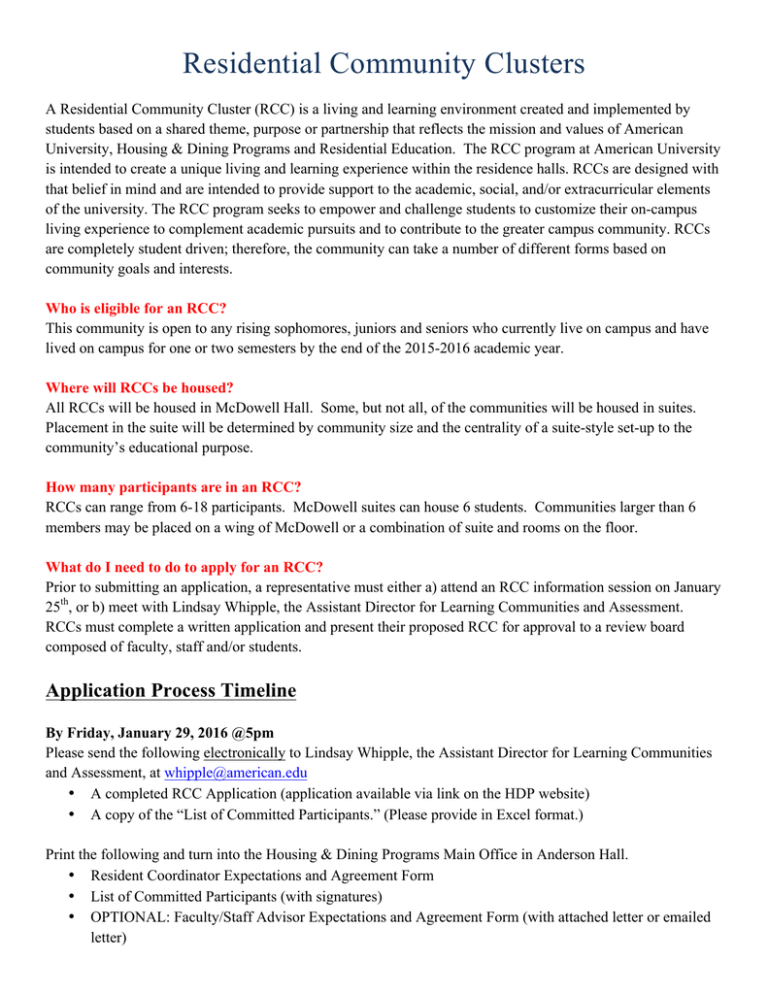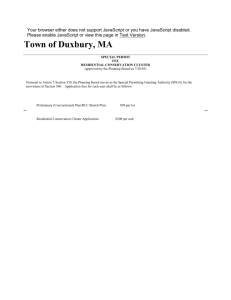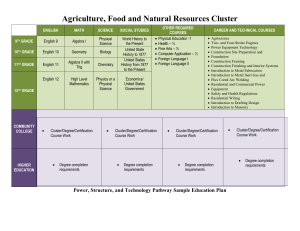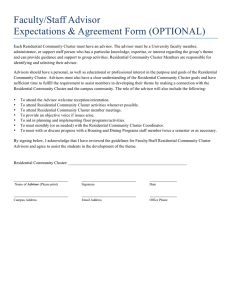Residential Community Clusters
advertisement

Residential Community Clusters A Residential Community Cluster (RCC) is a living and learning environment created and implemented by students based on a shared theme, purpose or partnership that reflects the mission and values of American University, Housing & Dining Programs and Residential Education. The RCC program at American University is intended to create a unique living and learning experience within the residence halls. RCCs are designed with that belief in mind and are intended to provide support to the academic, social, and/or extracurricular elements of the university. The RCC program seeks to empower and challenge students to customize their on-campus living experience to complement academic pursuits and to contribute to the greater campus community. RCCs are completely student driven; therefore, the community can take a number of different forms based on community goals and interests. Who is eligible for an RCC? This community is open to any rising sophomores, juniors and seniors who currently live on campus and have lived on campus for one or two semesters by the end of the 2015-2016 academic year. Where will RCCs be housed? All RCCs will be housed in McDowell Hall. Some, but not all, of the communities will be housed in suites. Placement in the suite will be determined by community size and the centrality of a suite-style set-up to the community’s educational purpose. How many participants are in an RCC? RCCs can range from 6-18 participants. McDowell suites can house 6 students. Communities larger than 6 members may be placed on a wing of McDowell or a combination of suite and rooms on the floor. What do I need to do to apply for an RCC? Prior to submitting an application, a representative must either a) attend an RCC information session on January 25th, or b) meet with Lindsay Whipple, the Assistant Director for Learning Communities and Assessment. RCCs must complete a written application and present their proposed RCC for approval to a review board composed of faculty, staff and/or students. Application Process Timeline By Friday, January 29, 2016 @5pm Please send the following electronically to Lindsay Whipple, the Assistant Director for Learning Communities and Assessment, at whipple@american.edu • A completed RCC Application (application available via link on the HDP website) • A copy of the “List of Committed Participants.” (Please provide in Excel format.) Print the following and turn into the Housing & Dining Programs Main Office in Anderson Hall. • Resident Coordinator Expectations and Agreement Form • List of Committed Participants (with signatures) • OPTIONAL: Faculty/Staff Advisor Expectations and Agreement Form (with attached letter or emailed letter) When submitting your forms to the Housing & Dining Programs Main Office in Anderson Hall, you must sign up for a presentation date and time. February 2-3, 2016 You will be responsible for giving a brief 30 minute presentation (approximately 15 minutes of presentation, 10 minutes of question and answer) on your proposal. Date and time options will be available for sign up at the Housing & Dining Programs office in Anderson Hall when you turn in your application. The committee will review your application and may return it for revisions or changes. February 18, 2016 Final acceptance/denial decisions (including hall placement) will be communicated to the Resident Coordinator of the Residential Community Cluster. RCC Proposal Guidelines Section 1: The Overview The overview should provide a general description of the Residential Community Cluster. It should provide reviewers with enough of a contextual understanding of the purpose and overall goals of the cluster to be able to easily understand the rest of the proposal. This is also an opportunity to catch the reviewers’ attention so be creative. If you are re-applying to continue an already existing RCC, please discuss the accomplishments and programs of the RCC from the previous year and what has been learned through the process. Section 2: The Educational Purpose Each Residential Community Cluster (RCC) should have a mission and goal that is consistent with the academic and cocurricular goals of American University. The Cluster’s purpose must go beyond merely enabling a group of friends to live together. Priority will be given to communities that articulate a blend of cultures, ideas, backgrounds, and experiences. Opportunities for interaction among diverse populations, intentional experiences to learn from other community members, as well as personal and community reflection are strongly encouraged. Each Residential Community Cluster will be expected to set goals that identify what participants hope to learn through the experience and how the cluster will contribute to the campus community. In this section, you will describe the specific learning outcomes for this cluster, the method that the cluster will use to achieve those outcomes (or curriculum), and the method through which the cluster will assess the achievement of its outcomes. This process is explained in the sections below and the Residential Education staff of Housing and Dining Programs welcomes the opportunity to assist in determining outcomes, curriculum and assessment methods. Learning Outcomes What will residents learn about themselves and their community by participating in the Residential Community Cluster that is being proposed? Be specific. The learning outcomes should be clearly stated and measureable. They should also be reasonable for the one-year time frame that the cluster will have to accomplish this outcome. Proposals should include a minimum of two learning outcomes. While there is no limit to the number of intended learning outcomes for participants, be mindful of the limitations of participants in the cluster and try to set reasonable expectations for the cluster and its participants. The goal is for participation in Residential Community Clusters to be an educational and an enjoyable experience. Community Participation Curriculum It is important to design a specific curriculum to ensure that the cluster is able to make progress towards its intended learning outcomes. A Community Participation Curriculum details the activities, programs, and learning opportunities that will be available to the Cluster. Provide an approximate timeline for the completion of each objective. There are many formats that can be used to support your learning objectives. Creative and innovative learning opportunities will increase the chances of the proposal being selected. Here are some examples: Faculty and Guest Speakers, Field Trips, Student Presentations, Bulletin Boards, and Service Learning Opportunities. Specific requirements o 5 events total per semester § 4 active, 1 passive § 2 closed, 3 open § 2 with faculty member Resources Needed What resources are needed to meet the educational objectives stated in the proposal? Provide a detailed request for essential resources with the proposal. Included in this request should be a request for any resources that are vital to individual participants or the community learning objectives. Section 3: Committed Group of Participants In order to make determinations as to the viability of a cluster, it is important to include a list of committed participants who have promised to be a part of the cluster. Each participant is responsible for signing up for room draw and assuring that they are eligible. This opportunity is only available to second year students (those with 3 semesters or less on campus). All RCCs will be located in McDowell Hall. No guarantees are made that a selected community will be placed in a McDowell Suite. Please assure that the List of Committed Participants Form is completed with signatures and an Excel version is emailed. It is important that each participant is aware that if the RCC is not accepted and s/he still wishes to remain on-campus for the 2014-2015 academic year s/he must then participate in the room selection process. Section 4: The Resident Coordinator Identify one resident to be the Resident Coordinator for the RCC. This individual will be responsible for the logistics and communication for the community. This individual is NOT the Resident Assistant. Indicate why this individual was selected and how this person can benefit the community being proposed. Attach the signed Resident Coordinator Expectations and Agreement Form with the proposal. Section 5: The Faculty/Staff Advisor Identify the Faculty/Staff Advisor for the Residential Community Cluster. This individual will provide advice and expertise for achieving the stated learning objectives. Indicate why this individual was selected and how this person can benefit the community being proposed. Housing & Dining Programs may be able to assist in identifying key faculty and staff who share the interests and objectives stated in the proposal. RCC Curriculum Proposal Topic/Area of Emphasis Learning outcomes Educational strategy Resources and support needed (room reservations, funding, collaboration, etc.) Resident Coordinator (RC) Expectations & Agreement Form Each Residential Community Cluster is required to designate a member to serve as a Resident Coordinator (RC). This position may be shared by two members if seen fit by the group, and this voluntary position is a structured opportunity to serve as a liaison with Housing & Dining Programs, other Residential Community Clusters, and the campus community. The Resident Coordinator (RC) is required to: • Attend and participate in all orientation and other ongoing trainings (unless otherwise arranged with Housing & Dining Programs). • Schedule all floor member meetings. • Oversee program planning. • Distribute information to the residents of the Residential Community Cluster. • Attend a monthly meeting with a Housing & Dining staff member to keep lines of communication open between the Residential Community Cluster and Housing and Dining Programs. • Meet at least monthly (or as needed) with the Residential Community Cluster advisor. By signing below, I acknowledge that I have read and understand the 2015-2016 Residential Community Cluster information and application packet, and have reviewed the above expectations for the Residential Community Cluster Coordinator, understand them, and agree to abide by them. Residential Community Cluster: _________________________________________________________ _________________________ Name of Primary Coordinator (Please print) __________________________ _________________ Signature Date AU ID# of Primary Coordinator Email Address __________________________ __________________________ _________________ Signature Date Name of Co-Coordinator (Please print) AU ID# of Primary Coordinator Email Address *If the Residential Community Cluster Coordinator should leave the university or the program, for whatever reason, the Residential Community Cluster is expected to assign a new Residential Community Cluster Coordinator immediately. Faculty/Staff Advisor Expectations & Agreement Form Each Residential Community Cluster must have an advisor. The advisor must be a University faculty member, administrator, or support staff person who has a particular knowledge, expertise, or interest regarding the group’s theme and can provide guidance and support to group activities. Residential Community Cluster Members are responsible for identifying and selecting their advisor. Advisors should have a personal, as well as educational or professional interest in the purpose and goals of the Residential Community Cluster. Advisors must also have a clear understanding of the Residential Community Cluster goals and have sufficient time to fulfill the requirement to assist members in developing their theme by making a connection with the Residential Community Cluster and the campus community. The role of the advisor will also include the following: • • • • • • • To attend the Advisor welcome reception/orientation. To attend Residential Community Cluster activities whenever possible. To attend Residential Community Cluster member meetings. To provide an objective voice if issues arise. To aid in planning and implementing floor programs/activities. To meet monthly (or as needed) with the Residential Community Cluster Coordinator. To meet with or discuss progress with a Housing and Dining Programs staff member twice a semester or as necessary. By signing below, I acknowledge that I have reviewed the guidelines for Faculty/Staff Residential Community Cluster Advisors and agree to assist the students in the development of the theme. Residential Community Cluster: _________________________________________________________ Name of Advisor (Please print) Campus Address Signature Date Email Address Office Phone List of Committed Participants Form Most RCCs are composed of a minimum of 6 students. All of the RCCs will be placed in McDowell Hall. On a spaceavailable-basis, these communities will be housed in McDowell suites although some communities may be placed in standard double rooms within McDowell. Students who have agreed to be community members by signing this form will not be able to participate in the subsequent Room Draw processes. Each RCC must keep all the members living together during the academic year. It is expected that every RCC group member help participate in the planning and organization of at least one RCC sponsored activity per semester. If at any time a RCC does not fulfill the above components, the RCC can be subject to: o Denial of Residential Community Cluster funding o Reassignment o Loss of recognition as a Residential Community Cluster (RCC) If vacancies should occur during the year, spaces may be advertised and filled with another student. This is the joint responsibility of floor members and Housing & Dining staff. If vacancies are unable to be filled, Housing & Dining Programs reserves the right to place students into these openings who may not be affiliated with the RCC. We understand: • that in order to be eligible for participation in a Residential Community Cluster, each participant is responsible for assuring that s/he has signed up and is eligible for room selection; • that if our group does not receive a Residential Community Cluster assignment and an applicant to the RCC still plans to live on-campus next year, that applicant MUST participate in a subsequent part of the room selection process to select a space. Current resident students who do not select a space during room selection but who apply afterwards cannot be guaranteed on-campus housing for the 2015-2016 academic year. It is the responsibility of each student to ensure s/he confirms whether or not s/he has been assigned to a space and, consequently, whether or not s/he needs to participate in another part of the room selection process to select a different space; • by participating in the RCC selection process each participant is committing to live in that cluster for the 20152016 academic year; • All RCCs will be located in McDowell Hall. No guarantees are made that a selected community will be placed in a McDowell Suite. Name of RCC: Name _____________________ AU ID Number of Semesters OnCampus Name of Preferred Roommate Signature


